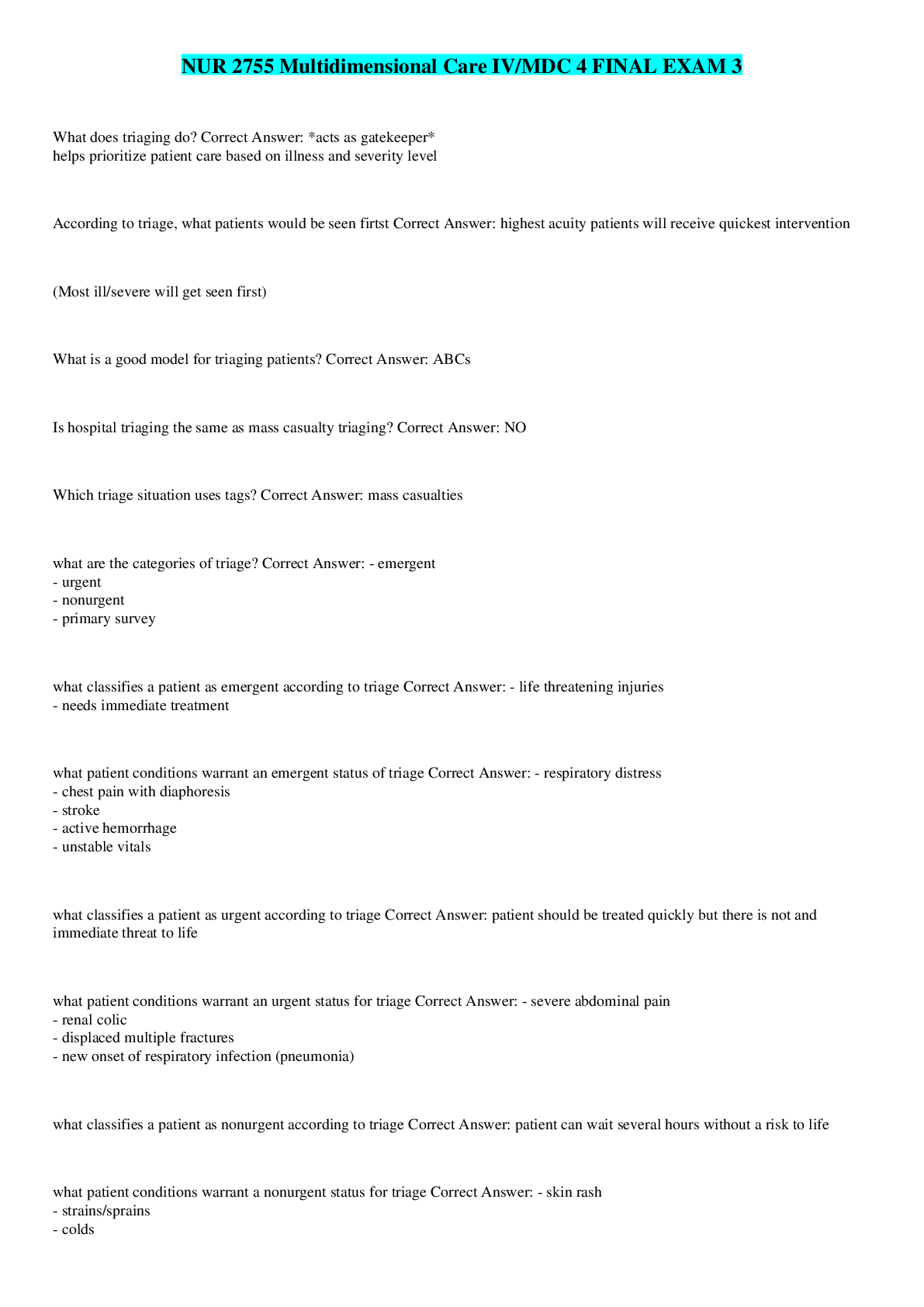Health Care > EXAM > NUR2755 / NUR 2755 Multidimensional Care 2 / MDC II - Final Exam - Rasmussen (All)
NUR2755 / NUR 2755 Multidimensional Care 2 / MDC II - Final Exam - Rasmussen
Document Content and Description Below
NUR2755 / NUR 2755 Multidimensional Care 2 / MDC II - Final Exam - Rasmussen *PT PAP HOT* ▪ Pituitary ▪ Thyroid ▪ Pancreas ▪ Adrenals ▪ Parathyroid ▪ Hypothalamus ▪ Ovari... es ▪ Testes - What are the glands of the endocrine system? (SATA Q?) Grave's disease - an autoimmune disorder that is caused by hyperthyroidism and is characterized by *goiter and/or exophthalmos* *Treatments* ▪ Rx: methimazole, atenolol, and *iodine-131* ▪ radiation therapy *Nursing Interventions* ▪ provide a calm environment ▪ keep patients room cool ▪ assess pain ▪ prepare patient for surgery ▪ post-operative care ▪ maintain a patent airway -------- same as hypothyroidism --------- ▪ provide periods of rest ▪ continuous cardiac monitoring ▪ monitor vital signs ▪ daily weight ▪ monitor I&O ▪ monitor laboratory tests ▪ apply antiembolism stockings to prevent DVT ▪ provide skin care - *HYPERthyroidism aka Grave's disease* ▪ Treatments pituitary gland - _________ is considered to be the "master gland" as it secretes hormones that control other parts of the endocrine system. ▪ ACTH ▪ TSH ▪ are the most life threatening because they cause a decrease in the secretion of vital hormones from the adrenal and thyroid glands. - *Anterior HYPOpituitarism* ▪ Deficiencies of which two hormones are the most life threatening? Bloodwork (*all are DECREASED*) ▪ T3 ▪ T4 ▪ Prolactin ▪ Testosterone ▪ Estradiol Scans (you'll always draw blood work first for diagnostics though) ▪ CT/MRI - detect bone or soft tissue lesions ▪ Skull X-ray - detect enlargement, erosions, and calcification of the sella turcica - *Anterior HYPOpituitarism* ▪ Laboratory & Diagnostic Tests TRUE! We have very small amounts of testosterone or estradiol no matter if we are men or women. - T/F: do both men and women have testosterone and estradiol? *INCREASED:* ▪ Prolactin - this might be the answer to the Q ▪ Cortisol ▪ TSH ▪ LH (men) ▪ FSH (men) ▪ Glucose *DECREASED:* ▪ Gonadotropin - *Anterior HYPERpituitarism* (SATA Q?) ▪ Laboratory Tests ▪ Prevent infection because they are immunosuppressed ▪ handwashing - HYPERcortisolism (aka Cushing's Disease) *Priority Intervention* diabetes insipidus - ▪ *Deficiency of ADH* resulting in large volumes of dilute urine ▪ A disorder of the posterior pituitary gland *They are losing a lot of water:* • polyuria • polydipsia • dehydration • fluid/electrolyte imbalance • dilute, low urine specific gravity (<1.005) • high plasma osmolarity • output does not decrease when fluid intake decreases *remember! your s/s are going to look like dehydration* • tachycardia • hypotension • poor turgor • dry mucous membranes • decreased cognition • ataxia • irritability - *Posterior Pituitary Gland: Diabetes Insipidus:* ▪ What will the patient present with?/Key Symptoms ▪ desmopressin acetate (a synthetic form of *vasopressin*) ▪ can be PO, SL, or intranasal - *Posterior Pituitary Gland: Diabetes Insipidus:* ▪ Drug Therapy Addison's disease - What is adrenal gland hypofunction? ▪ If the patient remains alert and oriented x 3 - *Addison's Disease* ▪ How do you know the therapy is working? ▪ Glucocorticoid drugs *MUST be withdrawn slowly so you don't wind up with Addison's or adrenal insufficiency* ▪ This allows for pituitary protection of ACTH and activation of the adrenal cortex to produce cortisol - *Addison's Disease* ▪ How do you discontinue glucocorticoid therapy to avoid secondary adrenal insufficiency? *▪ Muscle weakness* ▪ Muscle/joint pain ▪ Fatigue - *Addison's Disease* ▪ Neuromuscular S/S *▪ Hypertension* ▪ Dependent edema ▪ Bruising ▪ Petechiae - *Cushing's Disease aka hypercortisolism* ▪ Cardiovascular S/S *INCREASED* • blood glucose level • sodium level • late-night salivary cortisol **• urine cortisol** *DECREASED* • lymphocyte count • calcium level - *Cushing's Disease aka hypercortisolism* ▪ Laboratory Tests *INCREASED* *▪ potassium (K)* ▪ calcium (Ca) ▪ BUN *DECREASED* ▪ serum cortisol ▪ salivary cortisol ▪ fasting blood glucose *▪ sodium (Na)* - *Addison's Disease* ▪ Laboratory Tests Sodium increases Potassium decreases - In *hyperaldosteronism* what happens with potassium and sodium? (Remember...it's the opposite of Addison's disease) *Heat intolerance* - they are sweaty! - *Hyperthyroidism aka Grave's disease* ▪ Hallmark assessment Pheochromocytoma - a benign tumor of the adrenal medulla that causes the gland to produce excess epinephrine, so you are in a constant fight/flight state. ▪ Do not smoke ▪ Do not drink caffeine ▪ Do not change position suddenly ▪ Eat a diet rich in calories, vitamins, and minerals (avoid tyramine foods) Any of the above can cause a hypertensive crisis (closely monitor their BP!) *never palpate or can give pt a massive rush of catecholamines (epinephrine)* - *Pheochromocytoma* ▪ Patient Education *Cold intolerance* Other S/S: ▪ think dehydration: fatigue, weakness, lethargy, constipation, dry skin ▪ poor memory ▪ fatigue ▪ lack of energy -> sleeping more frequently ▪ muscle aches ▪ stiff muscles - *Hypothyroidism* ▪ Hallmark assessment Improvement usually occurs within 2 weeks - *Thyroid Therapy* ▪ When will a patient feel therapeutic effects? iatrogenic hypoparathyroidism - What does a thyroidectomy cause? Thyroid surgery can cause parathyroid gland injury which results in *tetany and hypocalcemia* Assess for: ▪ muscle twitching ▪ muscle spasms ▪ tingling around the mouth ▪ tingling of the toes and fingers ▪ hoarseness ▪ stridor ▪ suture line pressure ▪ thyroid storm - *Thyroid Surgery (thyroidectomy)* ▪ What is the biggest thing we are watching for post-op? *Think hypocalcemia S/S* ▪ muscle cramps ▪ muscle spasms of the hands and feet. ▪ Mild tingling/numbness to muscle tetany ▪ Seizures w/o loss of consciousness ▪ Irritability *▪ Positive Chvostek's and Trousseau's Signs* - *Hypoparathyroidism* ▪ Signs & Symptoms thyroid storm *priority: maintain a patent airway and adequate ventilation.* - ▪ a relatively rare, life-threatening condition caused by exaggerated hyperthyroidism ▪ an individual's heart rate, blood pressure, and body temperature can soar to dangerously high levels. *Even with treatment may lead to death.* DECREASE - hypothyroidism - As a person ages, thyroid levels may ______________. *INCREASED* ▪ TSH ▪ Serum thyroglobulin level (*Thyroid Cancer*) *DECREASED* ▪ T3, T4 - *Hypothyroidism* ▪ Diagnostic Labs *Treatments* ▪ Rx: levothyroxine sodium or liothyronine sodium *Nursing Interventions* ▪ maintain fluid restriction ▪ provide warm blankets ▪ assess bowel sounds and elimination patterns ▪ assess for changes in neurological status ▪ monitor for S/S of myxedema coma: bradycardia, hypotension, decreased RR, hypothermia, change in LOC --------- same as hyperthyroidism ---------- ▪ provide periods of rest ▪ continuous cardiac monitoring ▪ monitor vital signs ▪ daily weight ▪ monitor I&O ▪ monitor laboratory tests ▪ apply antiembolism stockings to prevent DVT ▪ provide skin care - *HYPOthyroidism* ▪ Treatments Hashimoto's disease - ▪ an autoimmune disease in which the body's own antibodies attack and destroy the cells of the thyroid gland ▪ chronic hypothyroidism ▪ triggered by bacterial or viral infection *INCREASED* ▪ T3, T4 *DECREASED* ▪ TSH - *Hyperthyroidism aka Grave's disease* ▪ Laboratory Tests type 1 diabetes mellitus - ____________ is an autoimmune disorder where *Beta cells are destroyed* ▪ *Polyuria* ▪ *Polydipsia* ▪ *Polyphagia* ▪ *Kussmaul Respirations* ▪ Fruity breath ▪ Abdominal pain ▪ Ketone bodies ▪ Dehydration ▪ Orthostatic Hypotension ▪ Hypoxia ▪ Weight loss ▪ Fatigue ▪ Nausea ▪ Anxiety ▪ Rashes ▪ Skin infections ▪ Peripheral neuropathy - *Type I Diabetes* ▪ Signs & Symptoms INCREASED: ▪ Hemoglobin A1C ▪ Random blood glucose ▪ Fasting blood glucose - *Type I or Type II Diabetes* ▪ Laboratory tests *Normal range: fasting glucose <110 mg/dL* *Normal range: hemoglobin A1C < 6.5%* ▪ They may have eaten poorly the night before (had alcohol or a high carb dinner) but otherwise have been compliant the past 3 months. - *How would you interpret?* ▪ A patient has a fasting blood glucose level of 260 mg/dL and a hemoglobin A1C of 6.0% *Normal range: fasting glucose <110 mg/dL* *Normal range: hemoglobin A1C < 6.5%* ▪ They tried to eat well a few days leading up to the test but have not been compliant the past 3 months. - *How would you interpret?* ▪ A patient has a fasting blood glucose level of 99 mg/dL and a hemoglobin A1C of 9.0% *Normal range: fasting glucose <110 mg/dL* *Normal range: hemoglobin A1C < 6.5%* ▪ They have not been compliant at all! - *How would you interpret?* ▪ A patient has a fasting blood glucose level of 260 mg/dL and a hemoglobin A1C of 10.0% *This is a short-acting, regular insulin* ▪ at the peak point (half-life), which for Novolin R is at *2.5-5 hrs* ▪ this means they need to plan to eat something at that time ▪ not recommended to take before bedtime b/c of this issue - If we are giving a patient Novolin R, when are they at the greatest risk for hypoglycemia? p. 1294 ▪ onset: 1-5 hours ▪ peak: 4-12 hours - *NPH (intermediate-acting insulin)* ▪ Onset, Peak p. 1294 ▪ onset: 2-4 hours ▪ peak: 6-12 hours - *Long-acting insulin* ▪ Onset, Peak p. 1294 Kussmaul breathing - _____________ is a type of hyperventilation that is the lung's emergency response to acidosis. It causes a labored, deeper breathing rate. It is most commonly associated with conditions that cause metabolic acidosis, *particularly diabetes* *▪ IV normal saline* *▪ regular, short-acting insulin* *▪ hydration* "Hydration...Insulin...Electrolyte Replacement" ▪ assess airway, LOC, hydration, electrolytes, and blood glucose ▪ check vitals every 15 minutes [Show More]
Last updated: 1 year ago
Preview 1 out of 21 pages
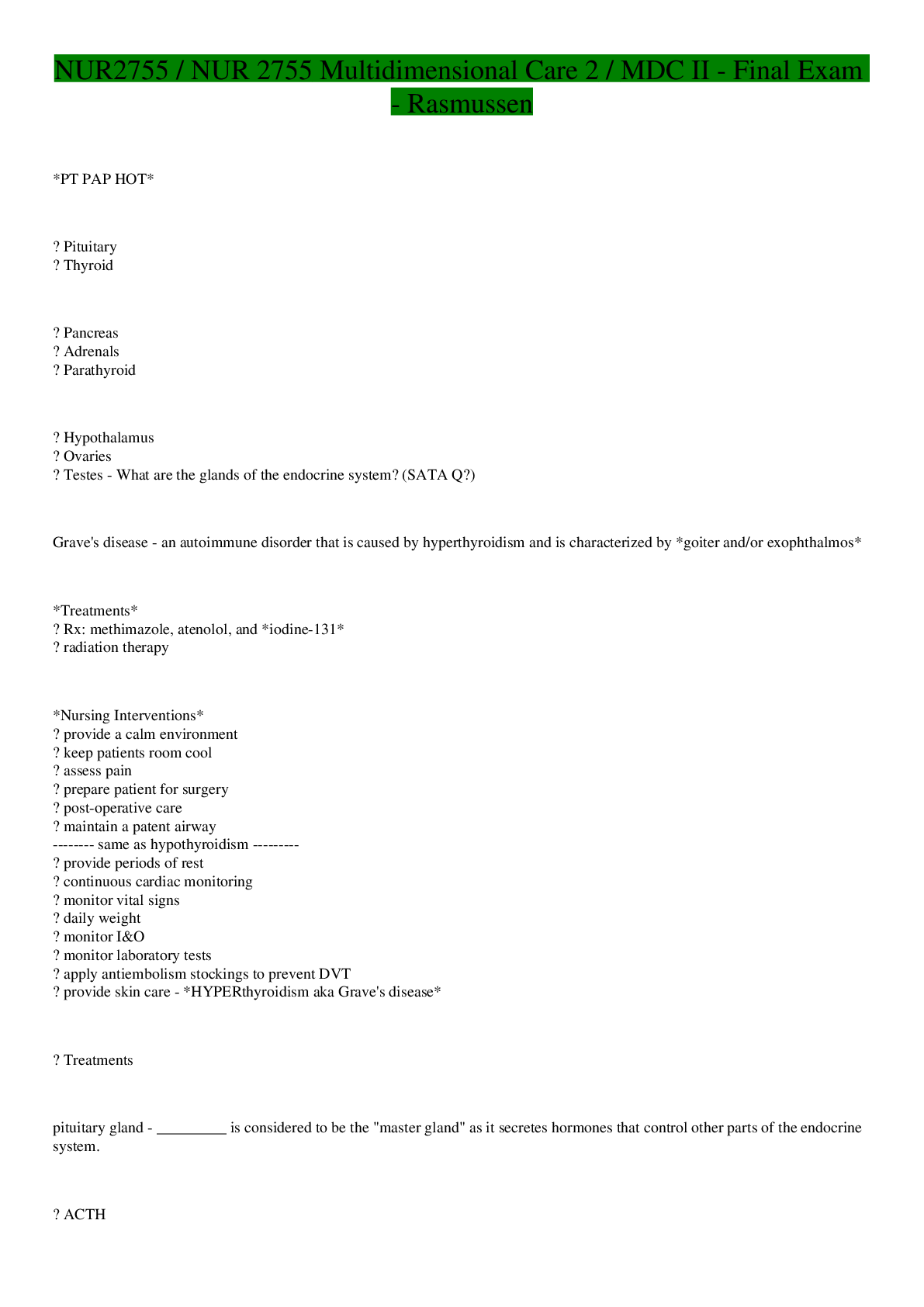
Reviews( 0 )
Document information
Connected school, study & course
About the document
Uploaded On
Jul 28, 2022
Number of pages
21
Written in
Additional information
This document has been written for:
Uploaded
Jul 28, 2022
Downloads
0
Views
21

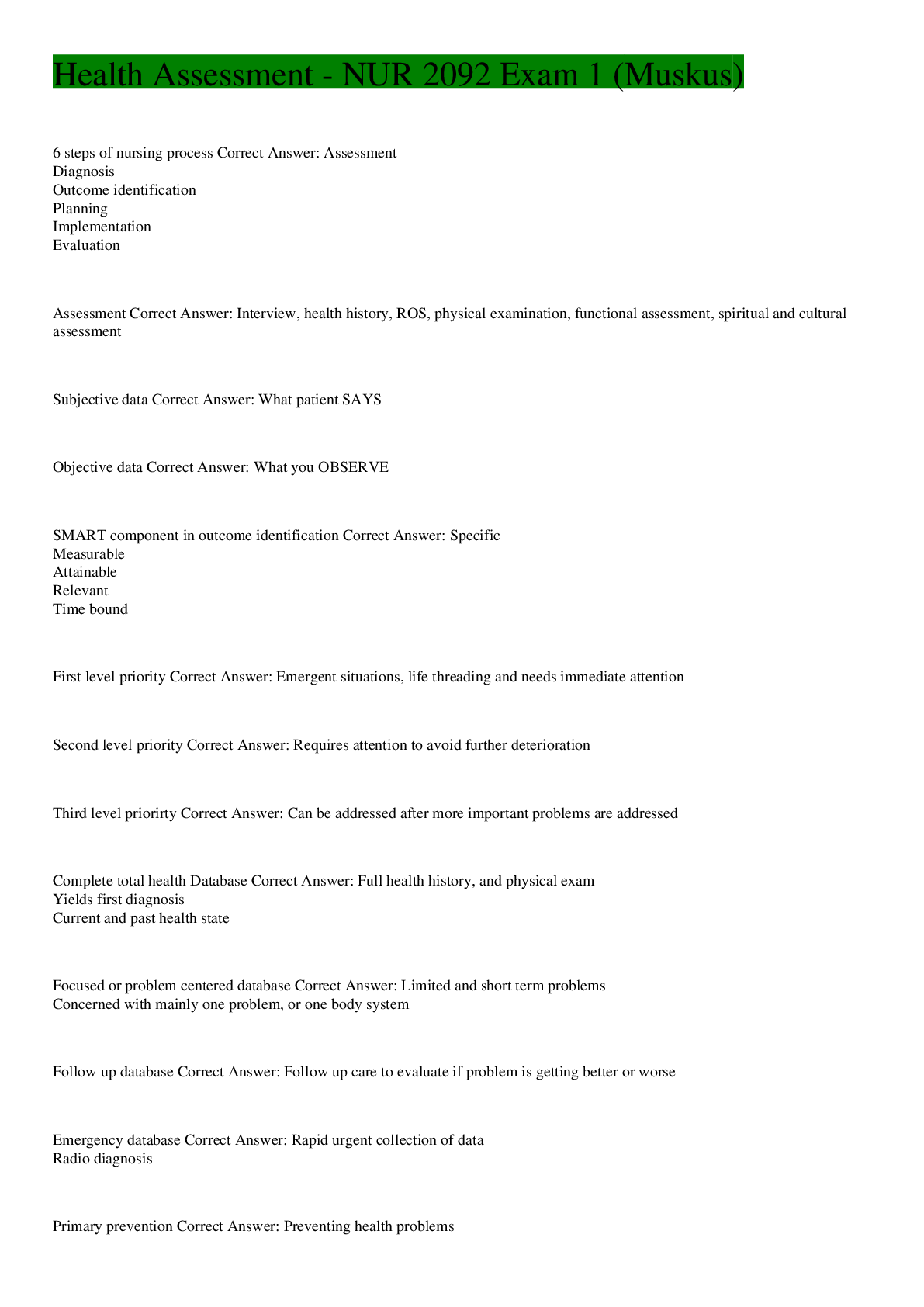
.png)
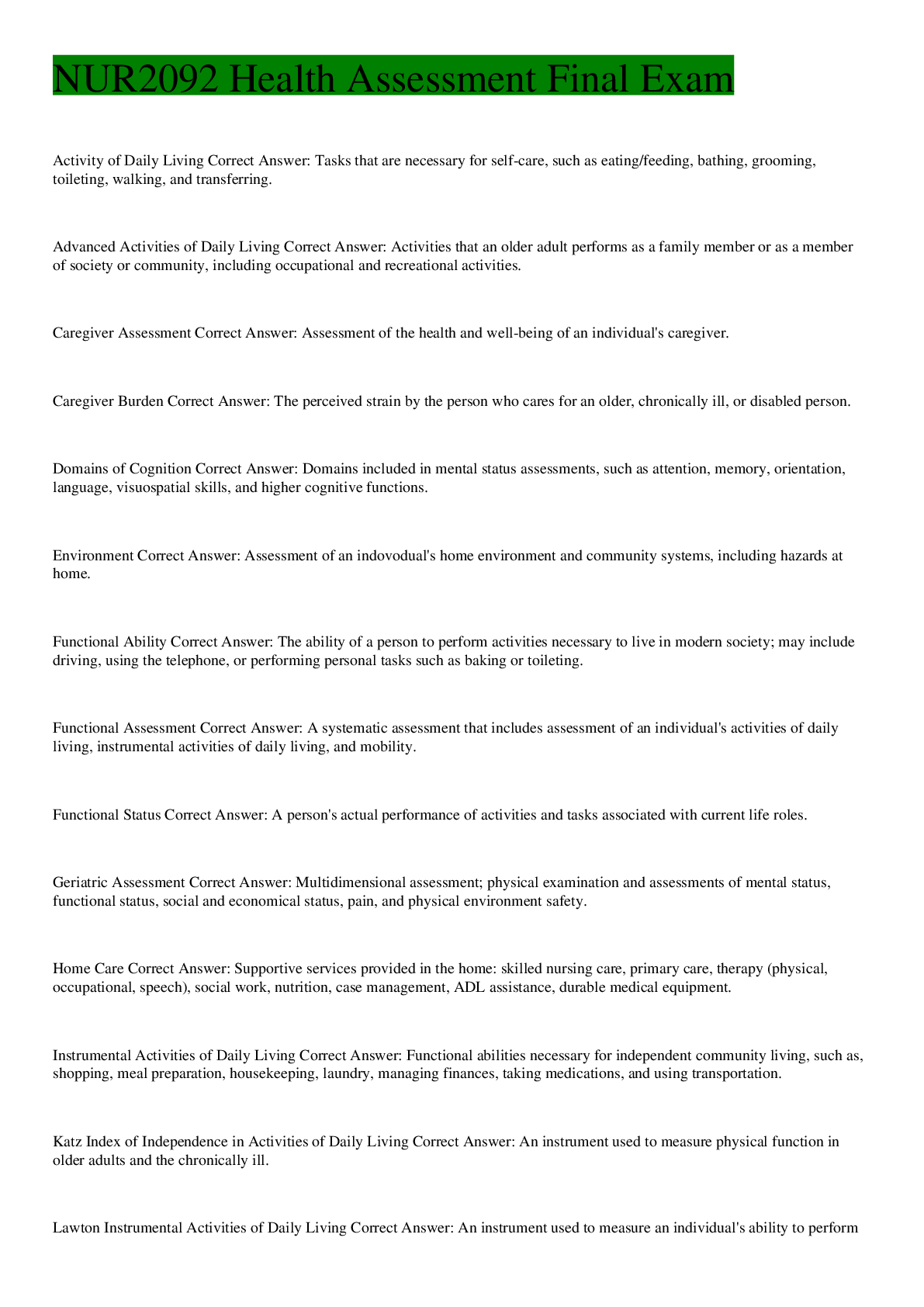
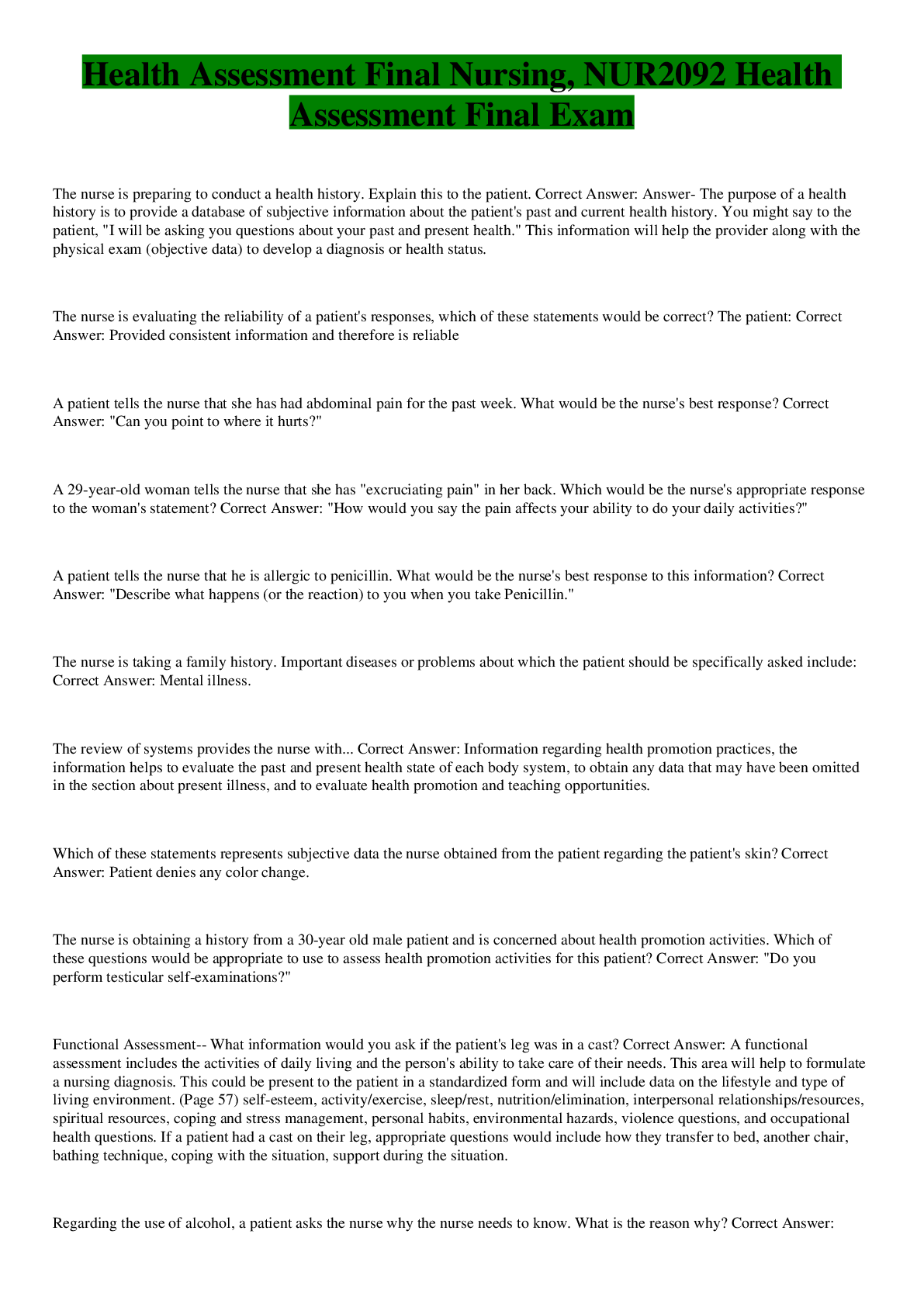
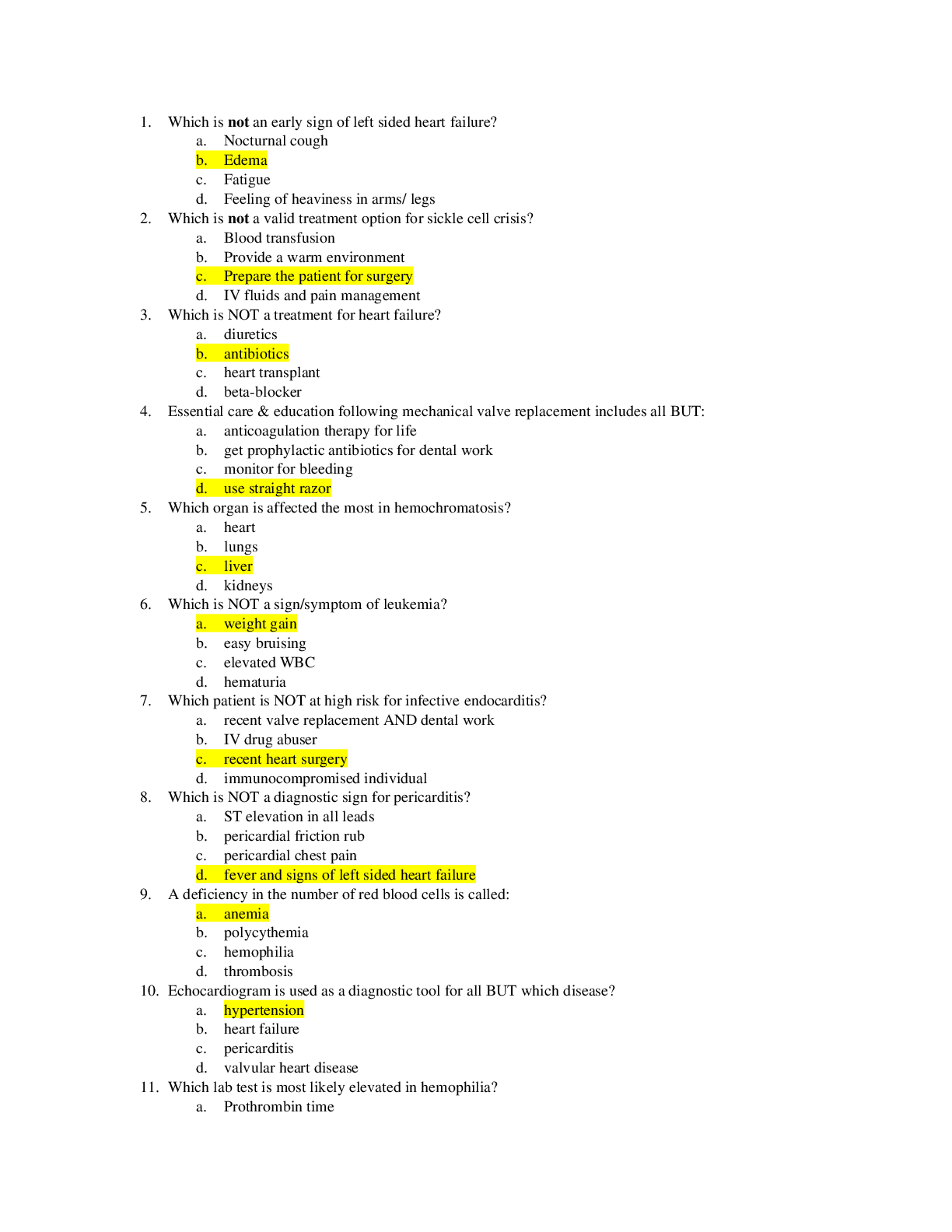
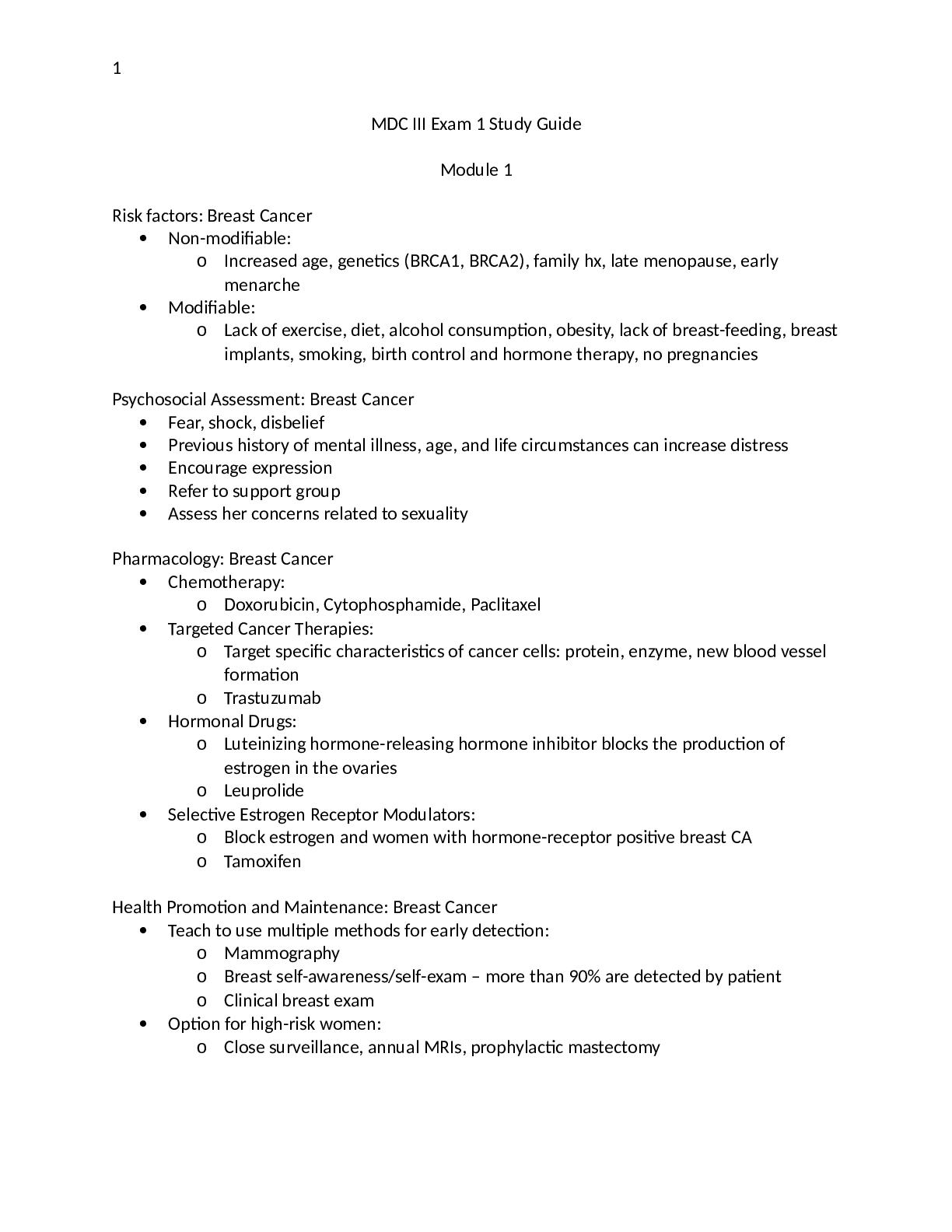
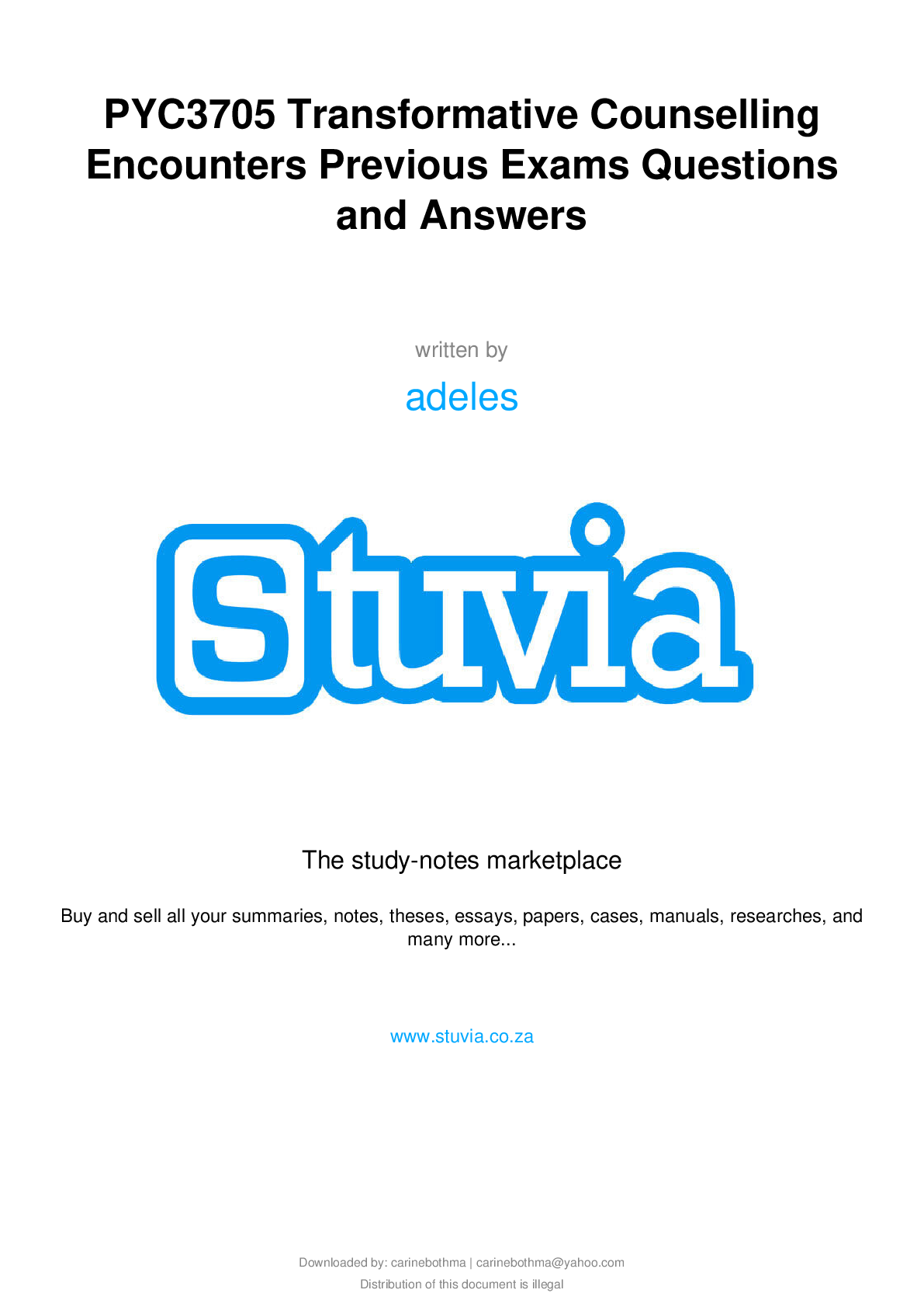
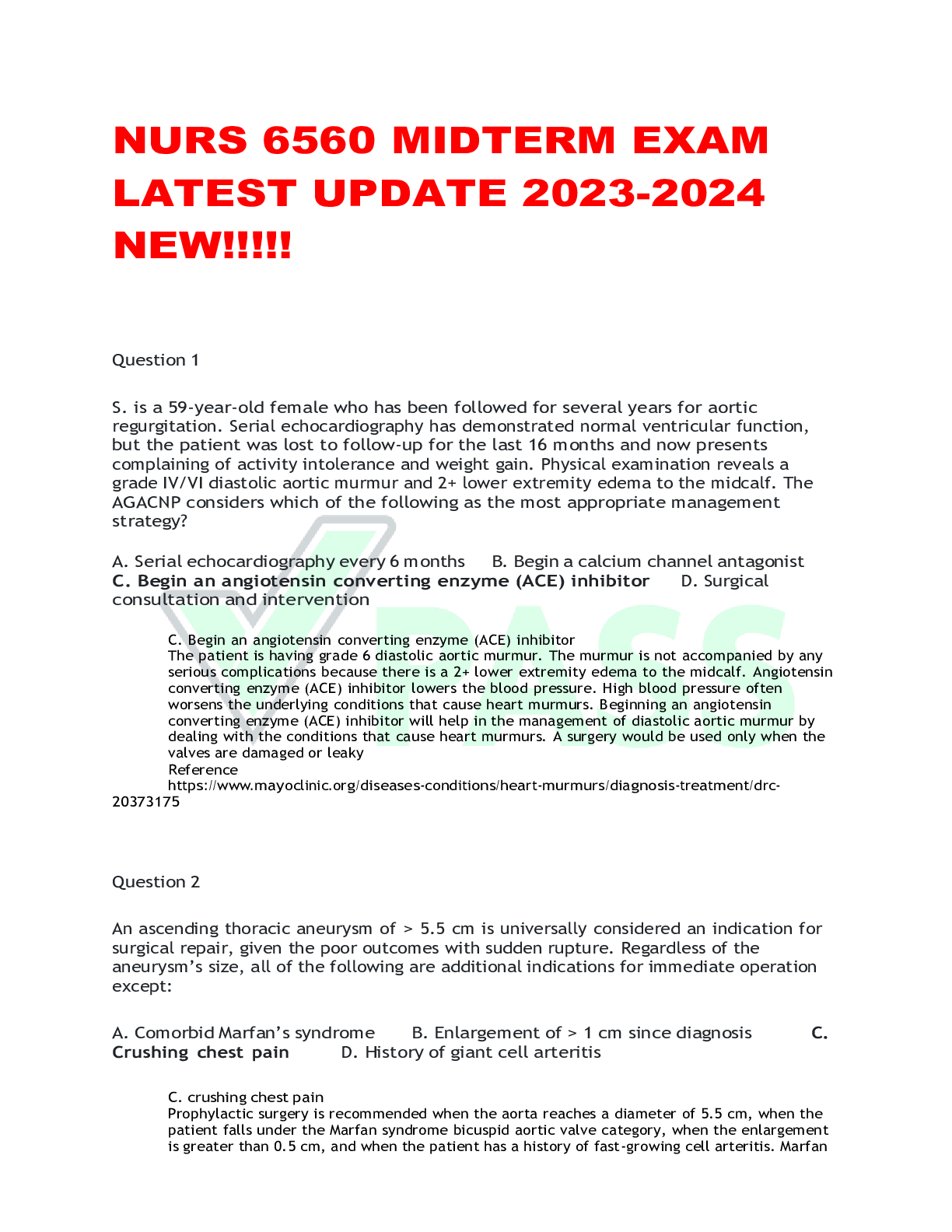
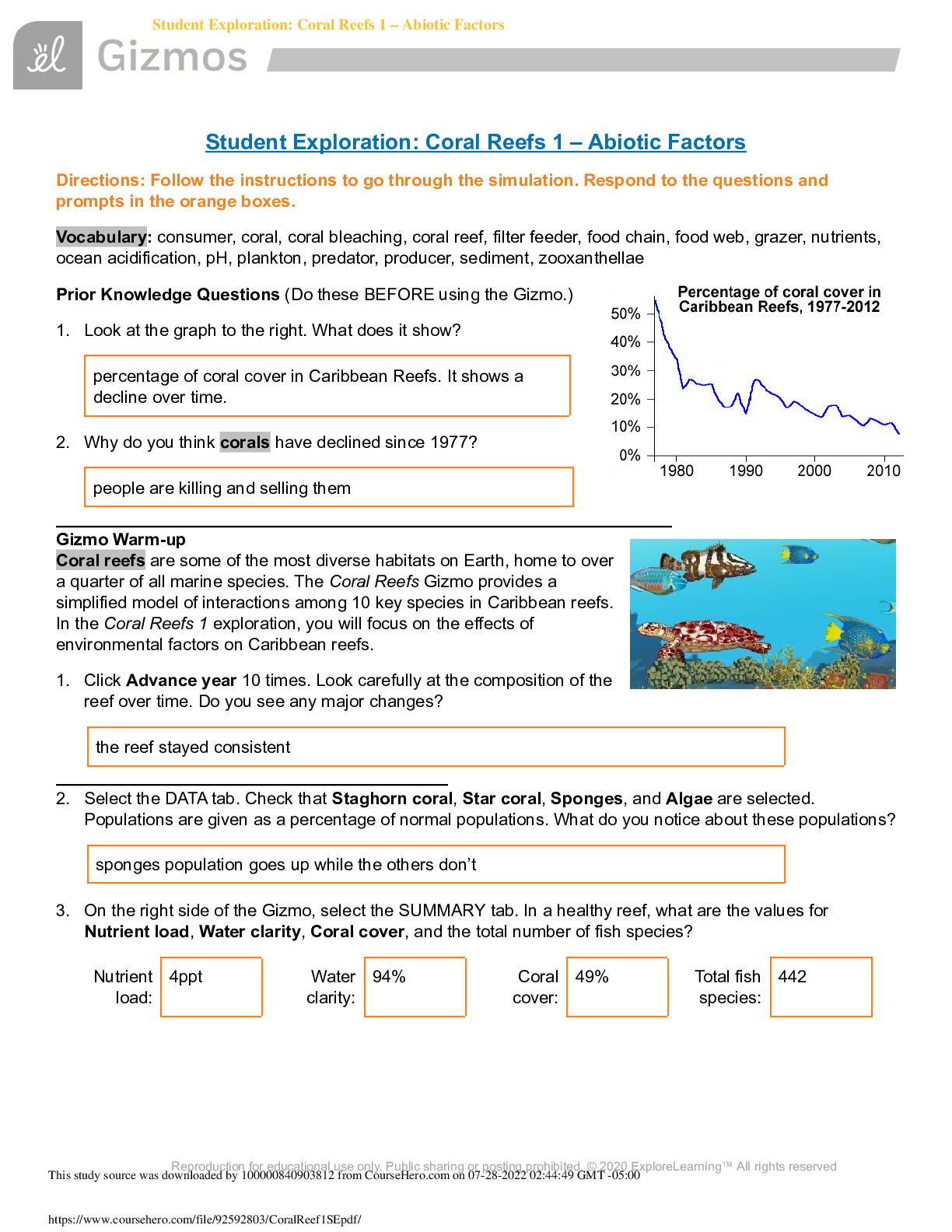
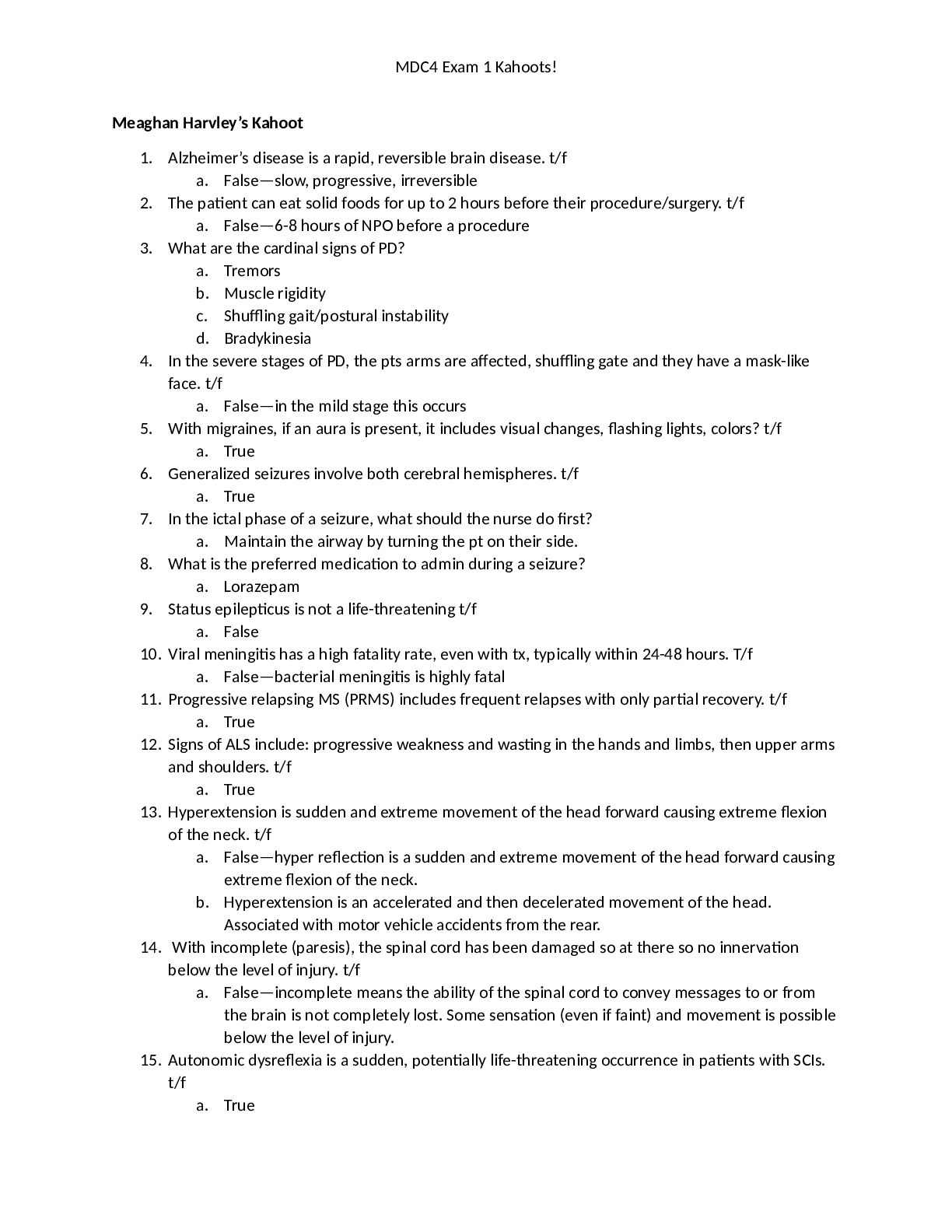
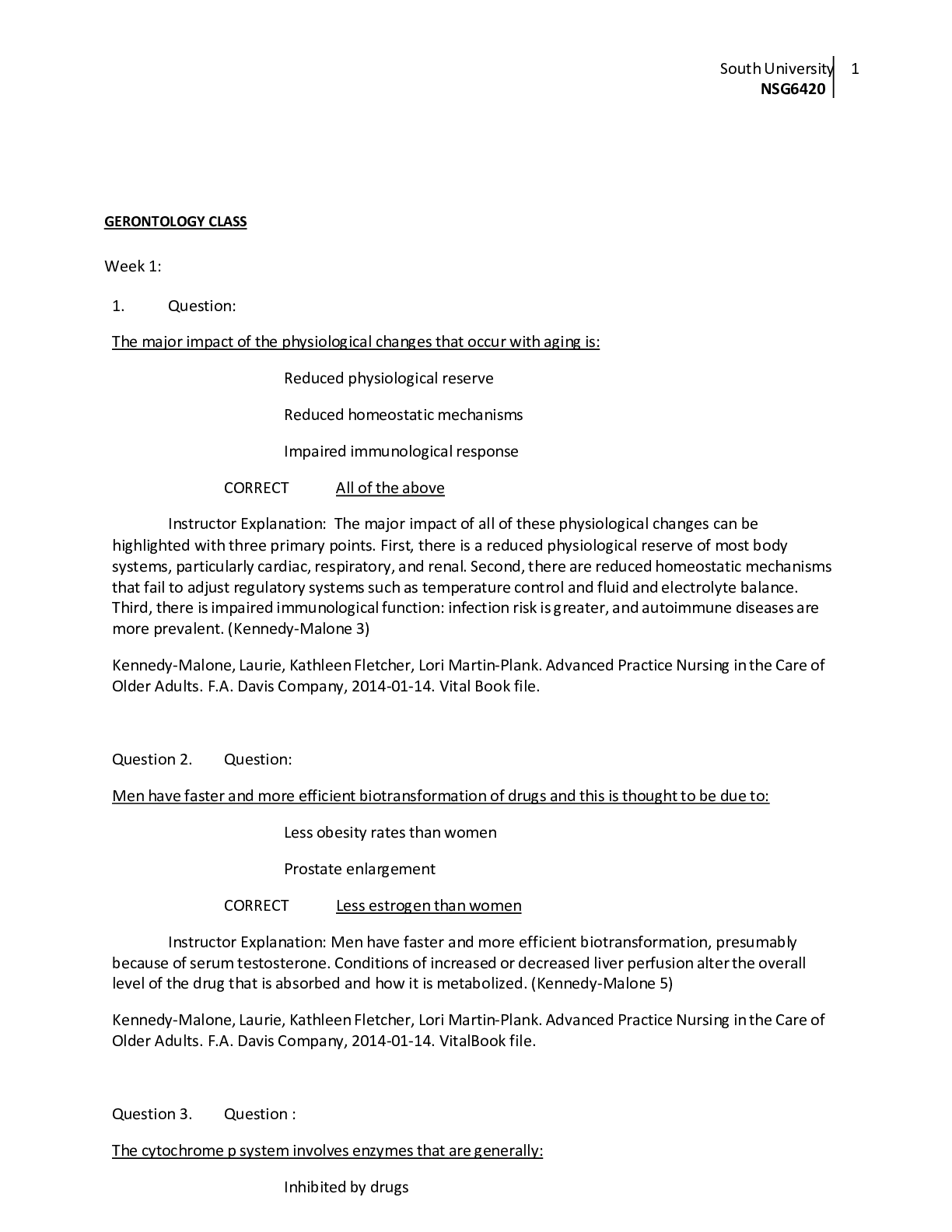
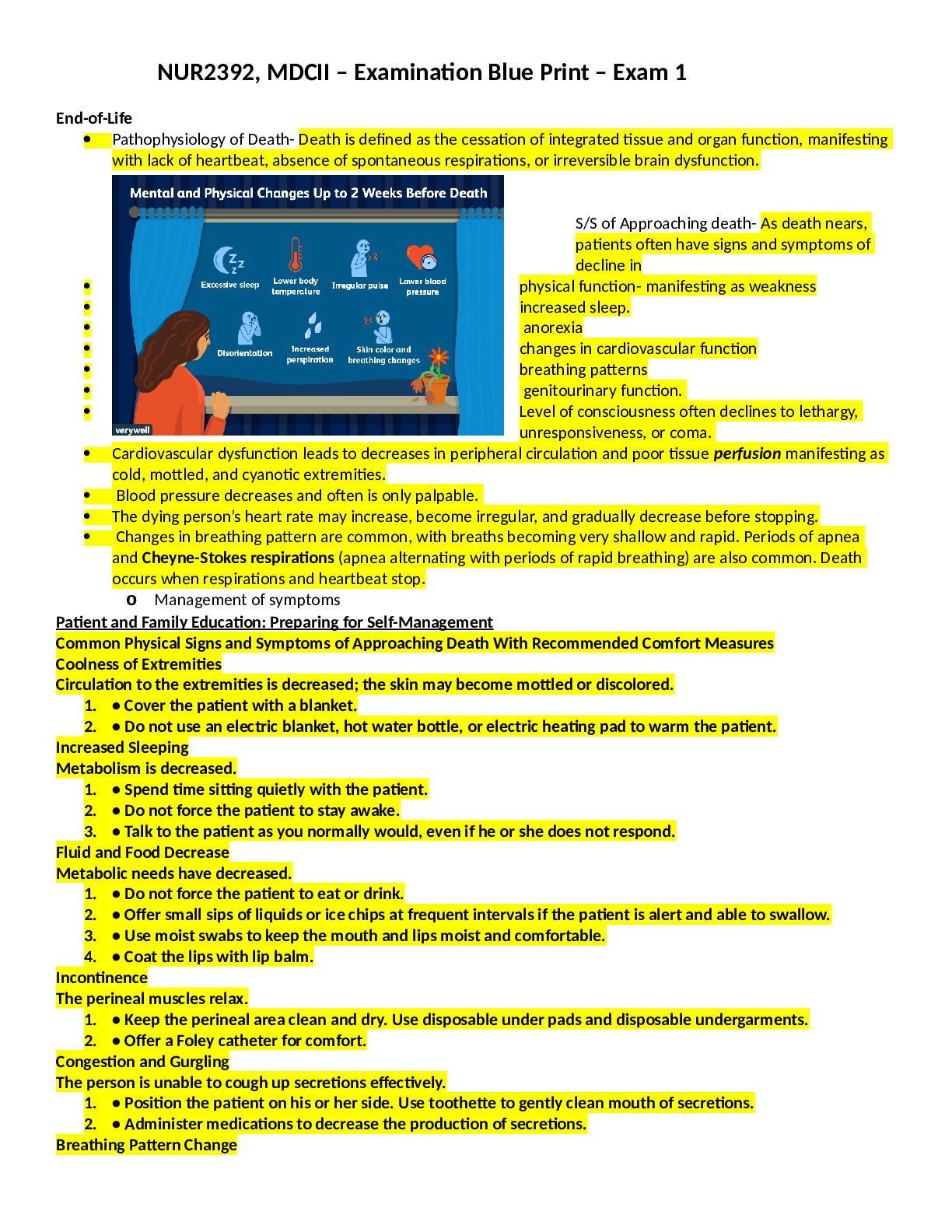
 (1).png)
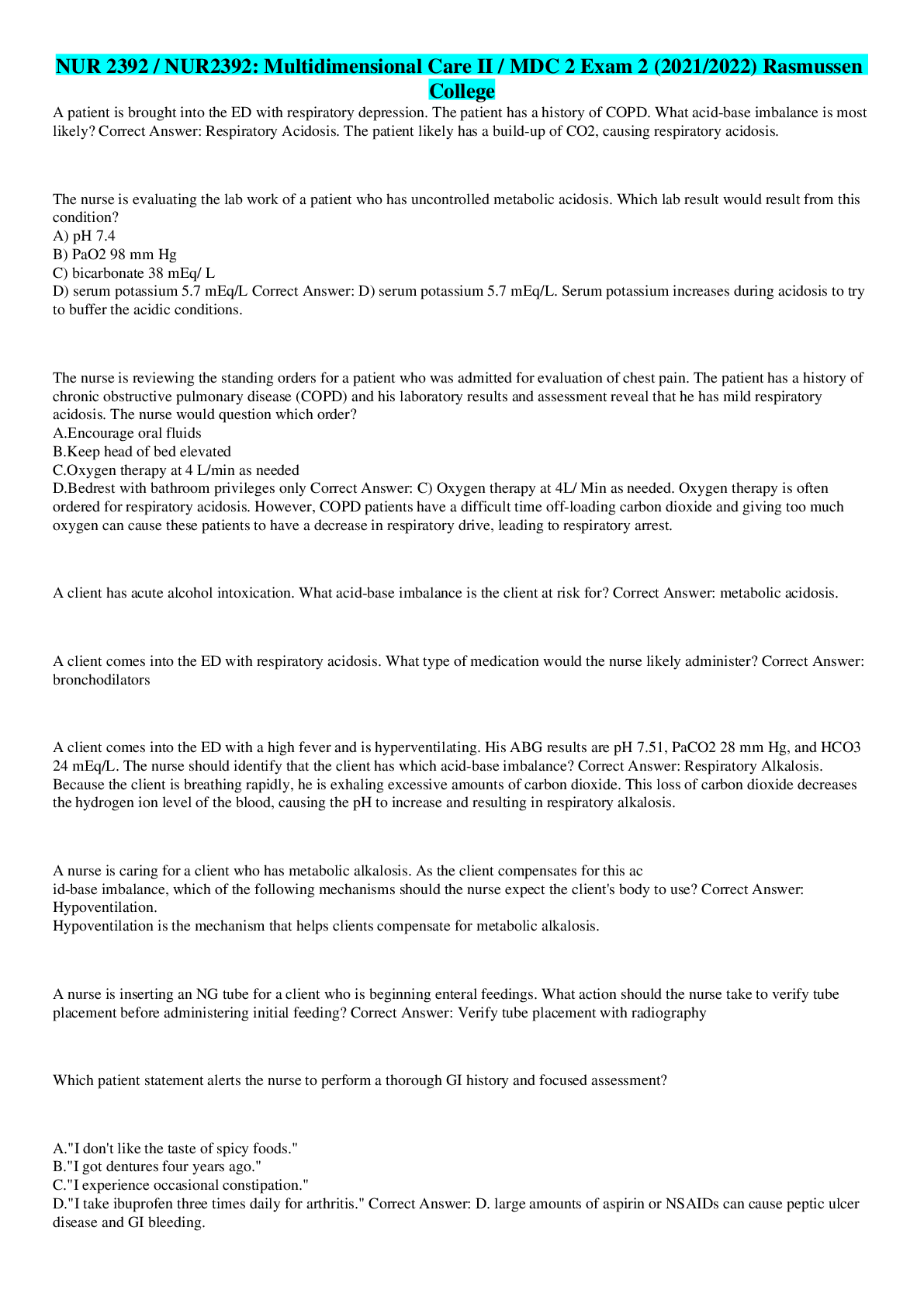
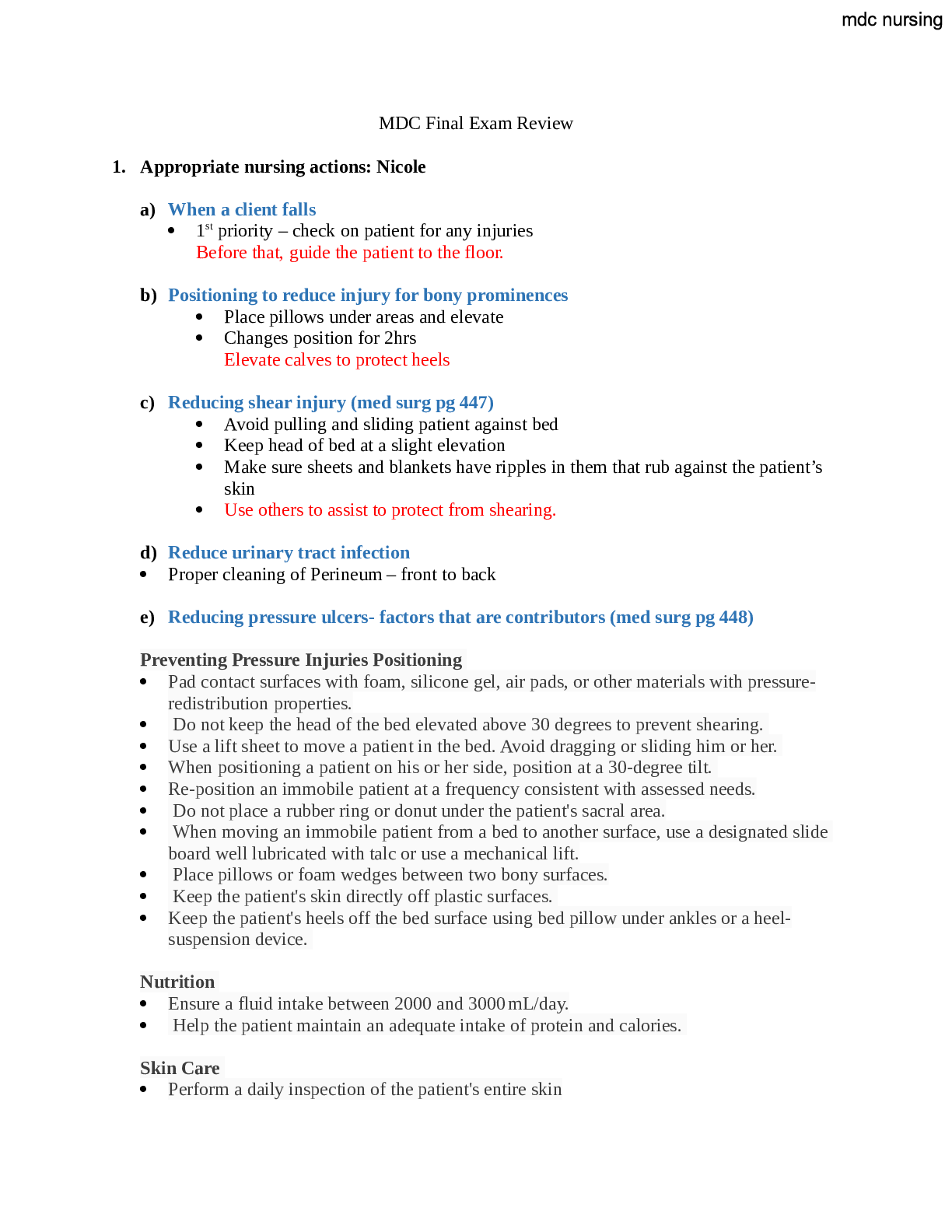
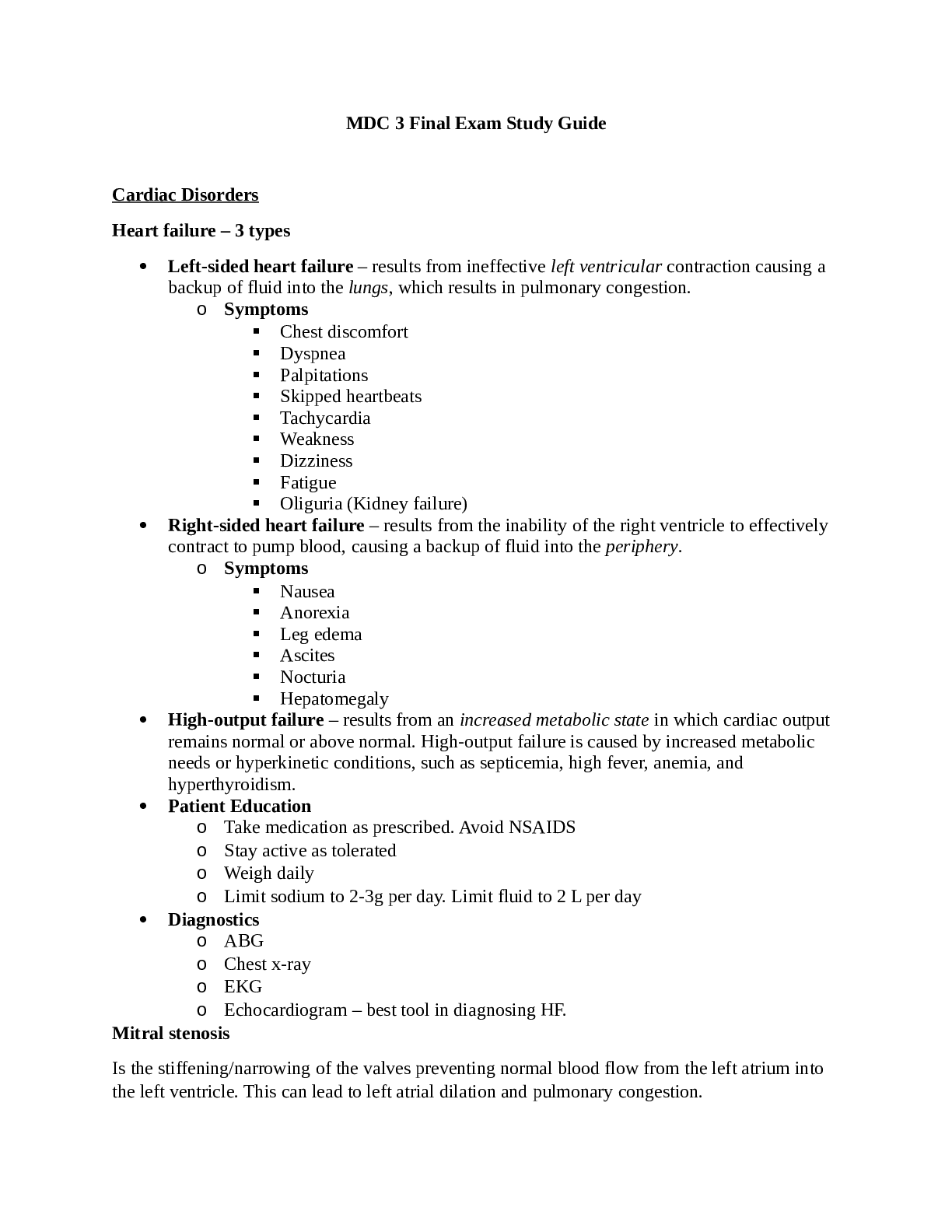
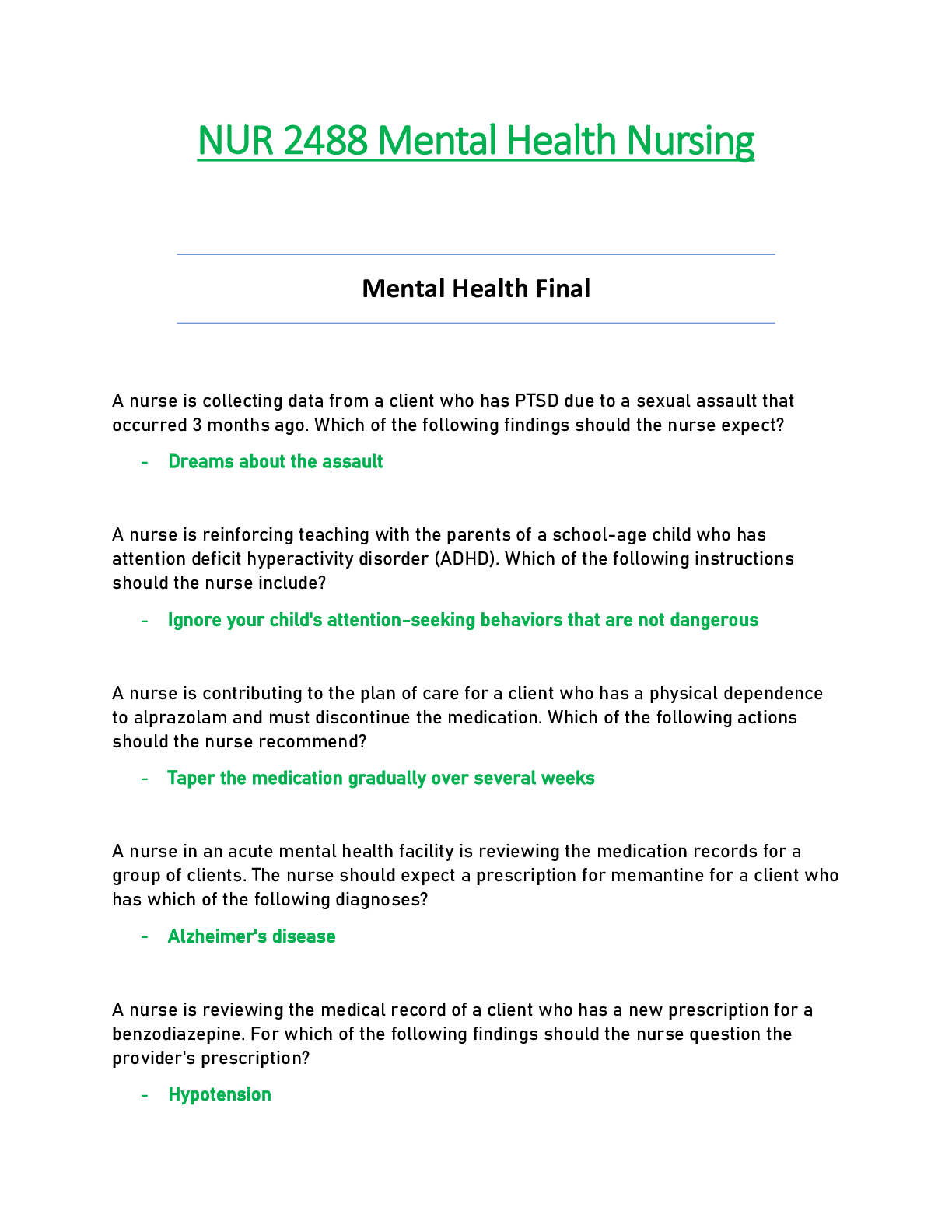
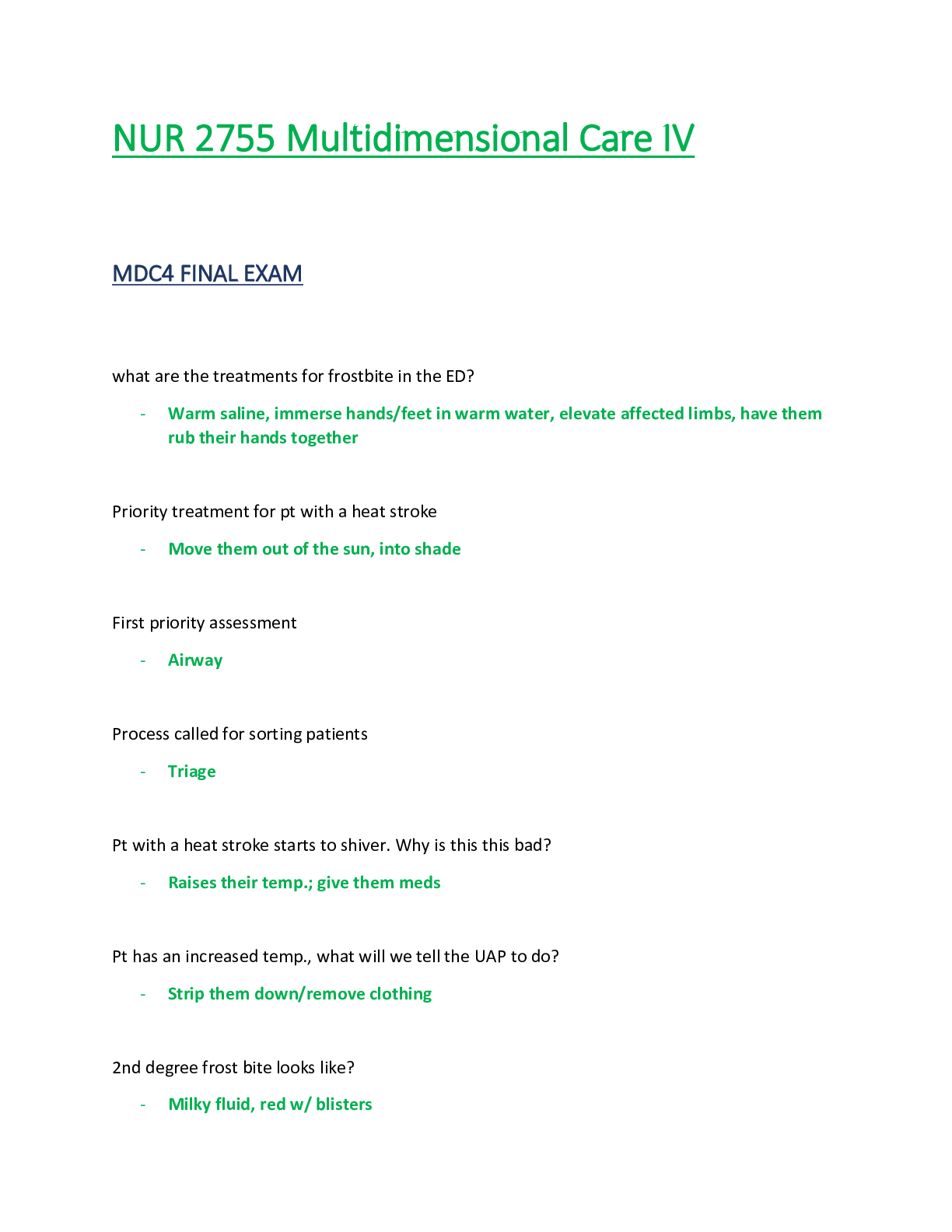
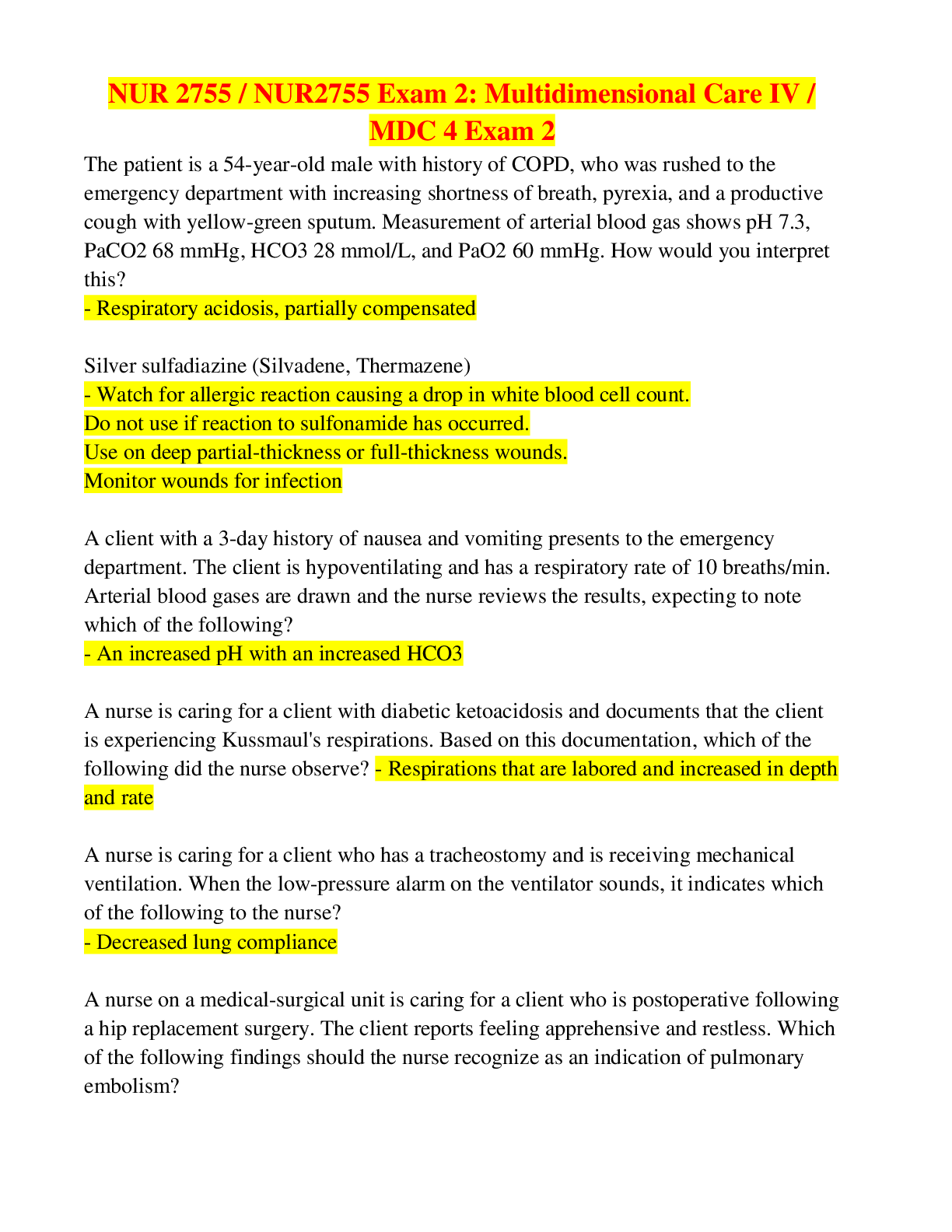
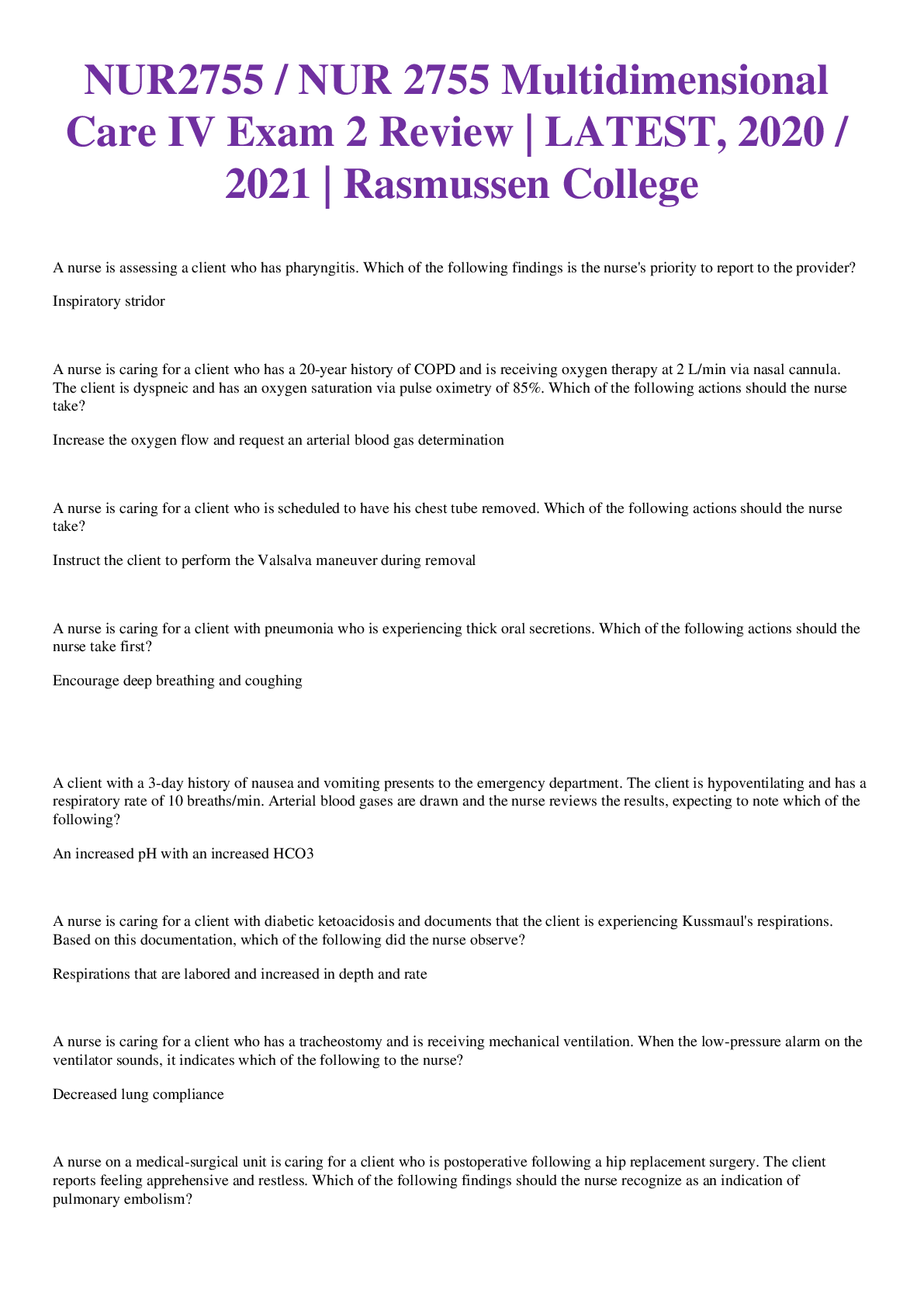
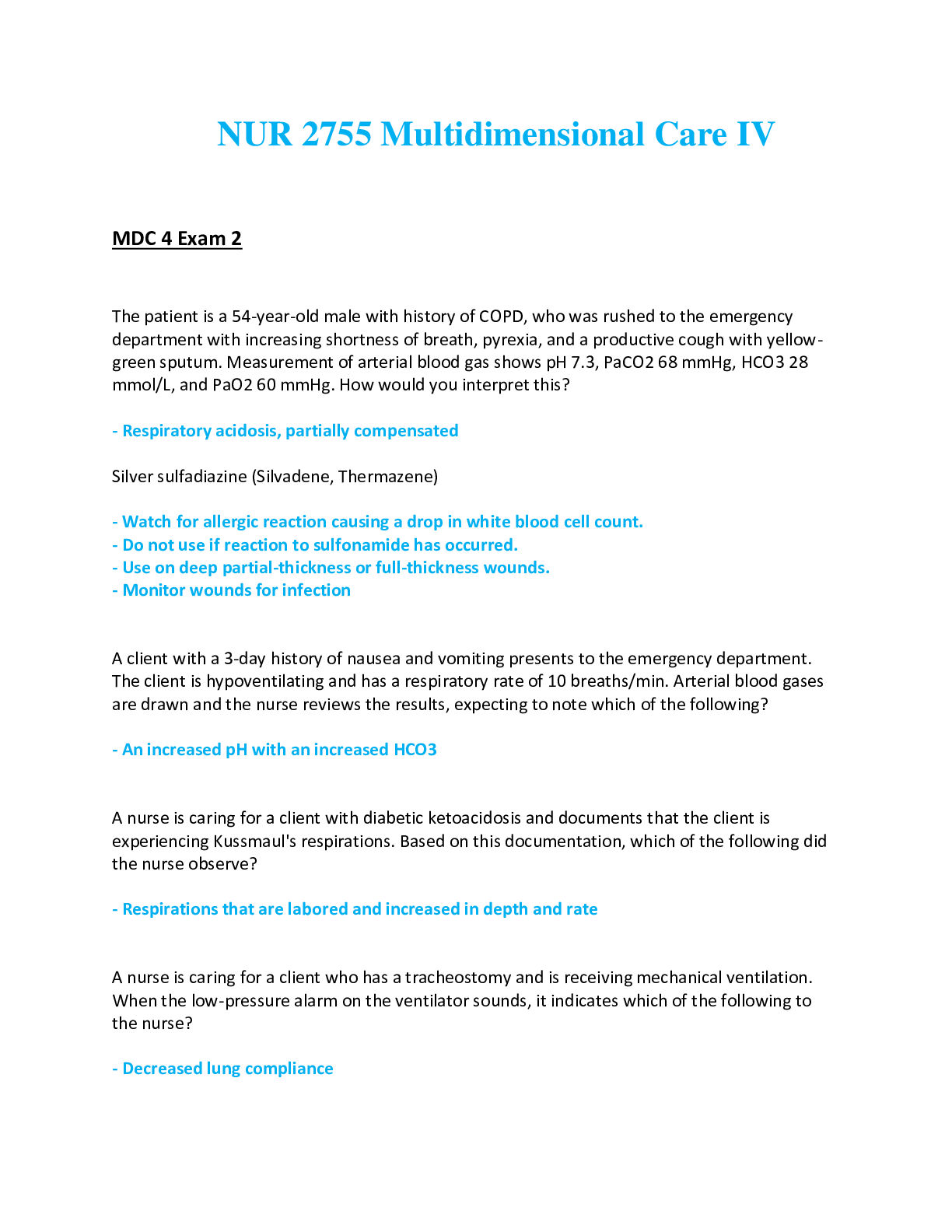
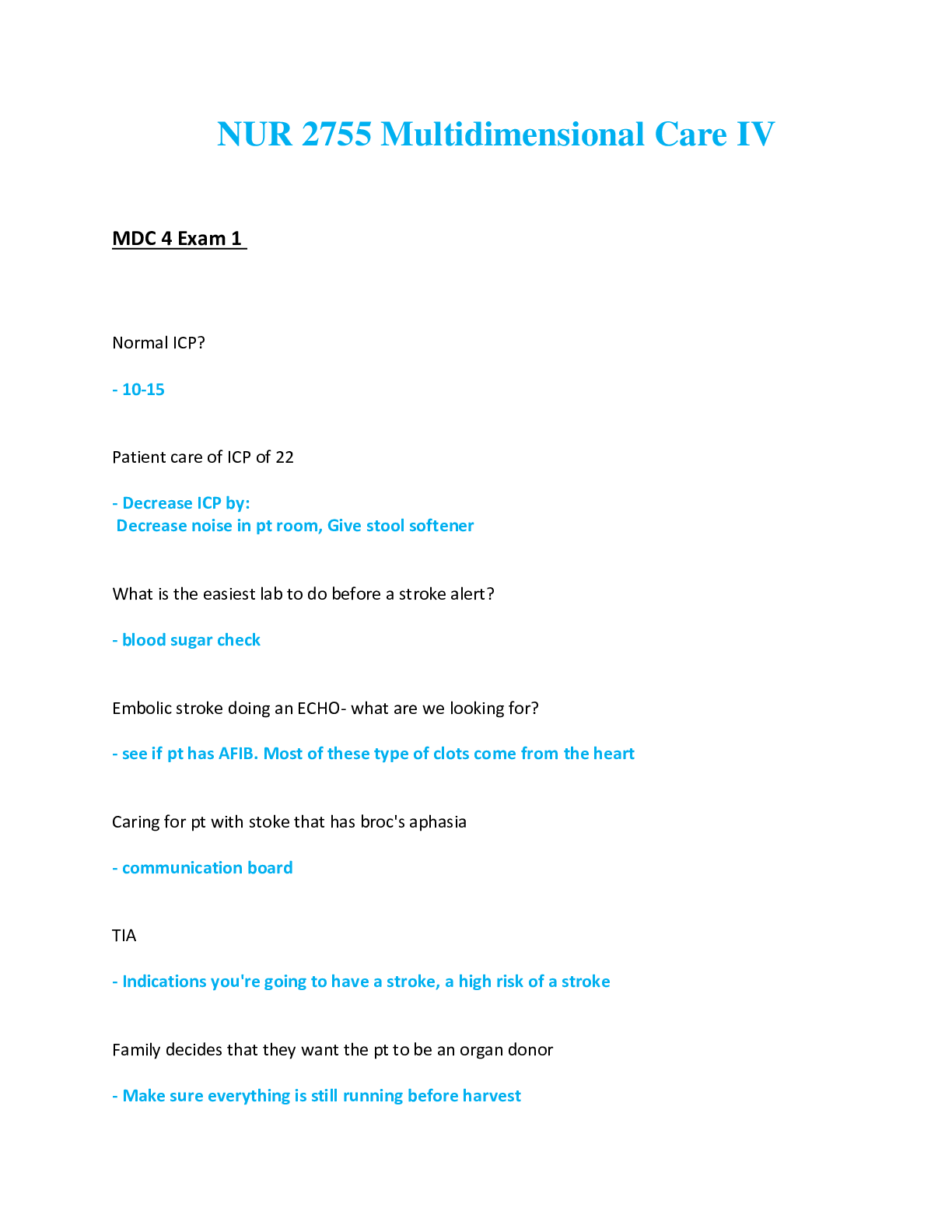
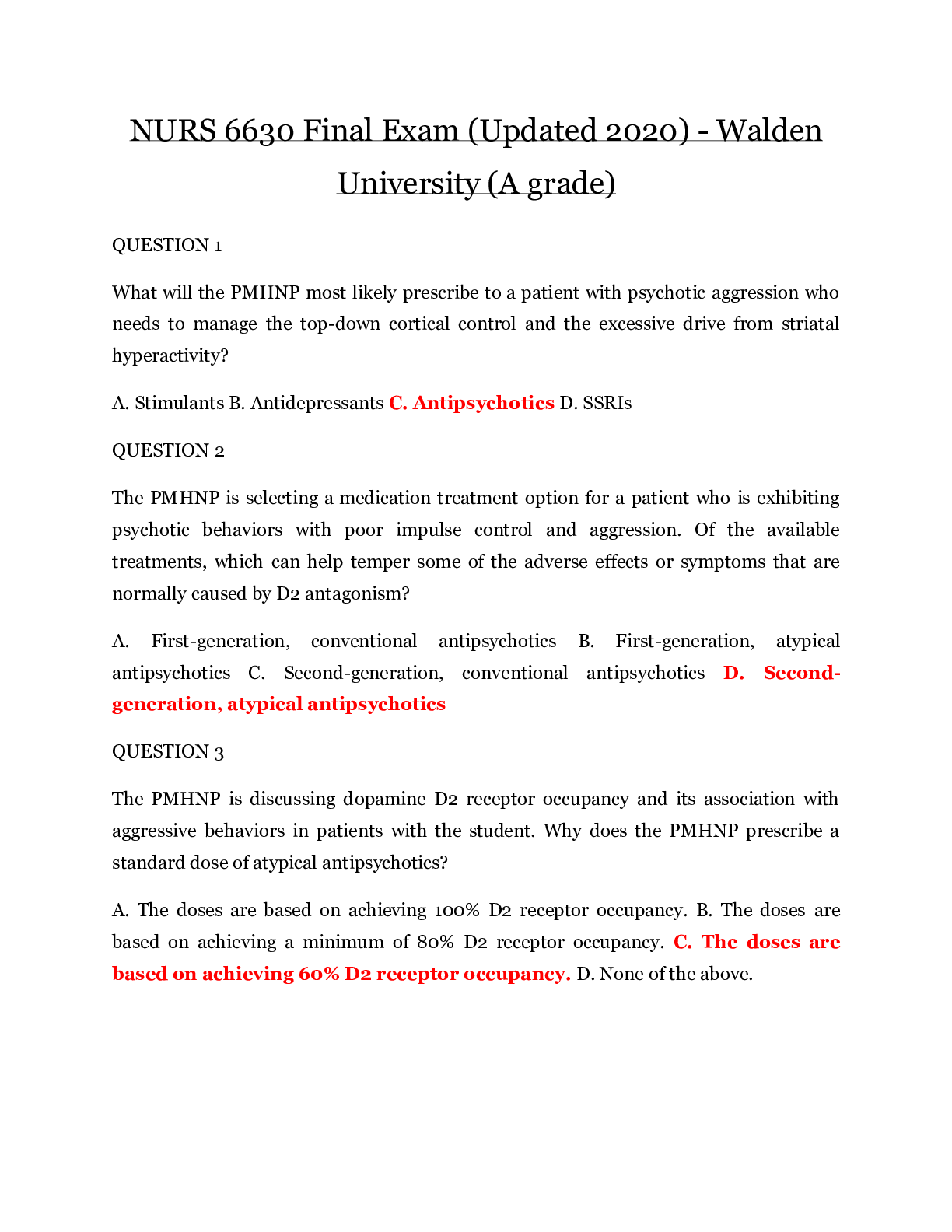
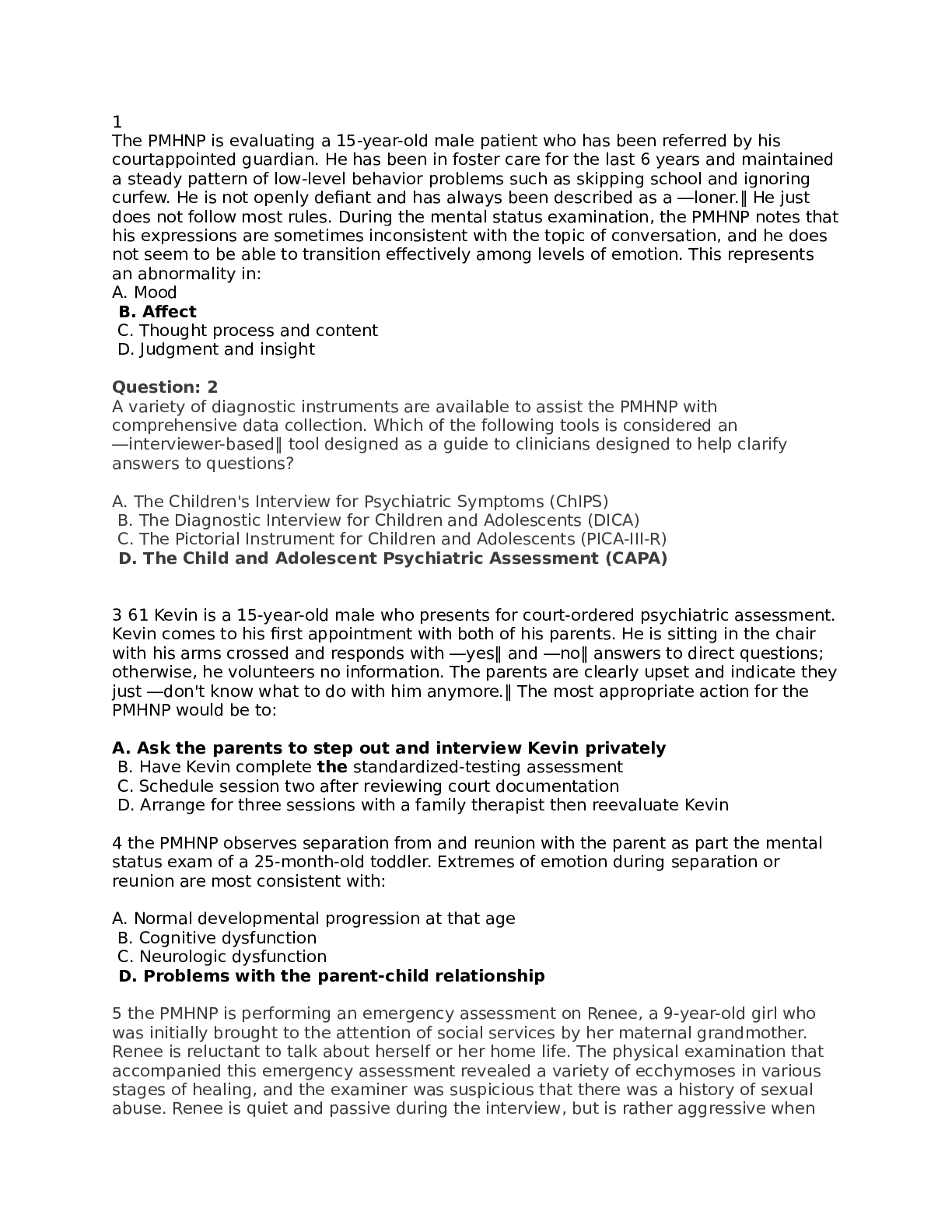
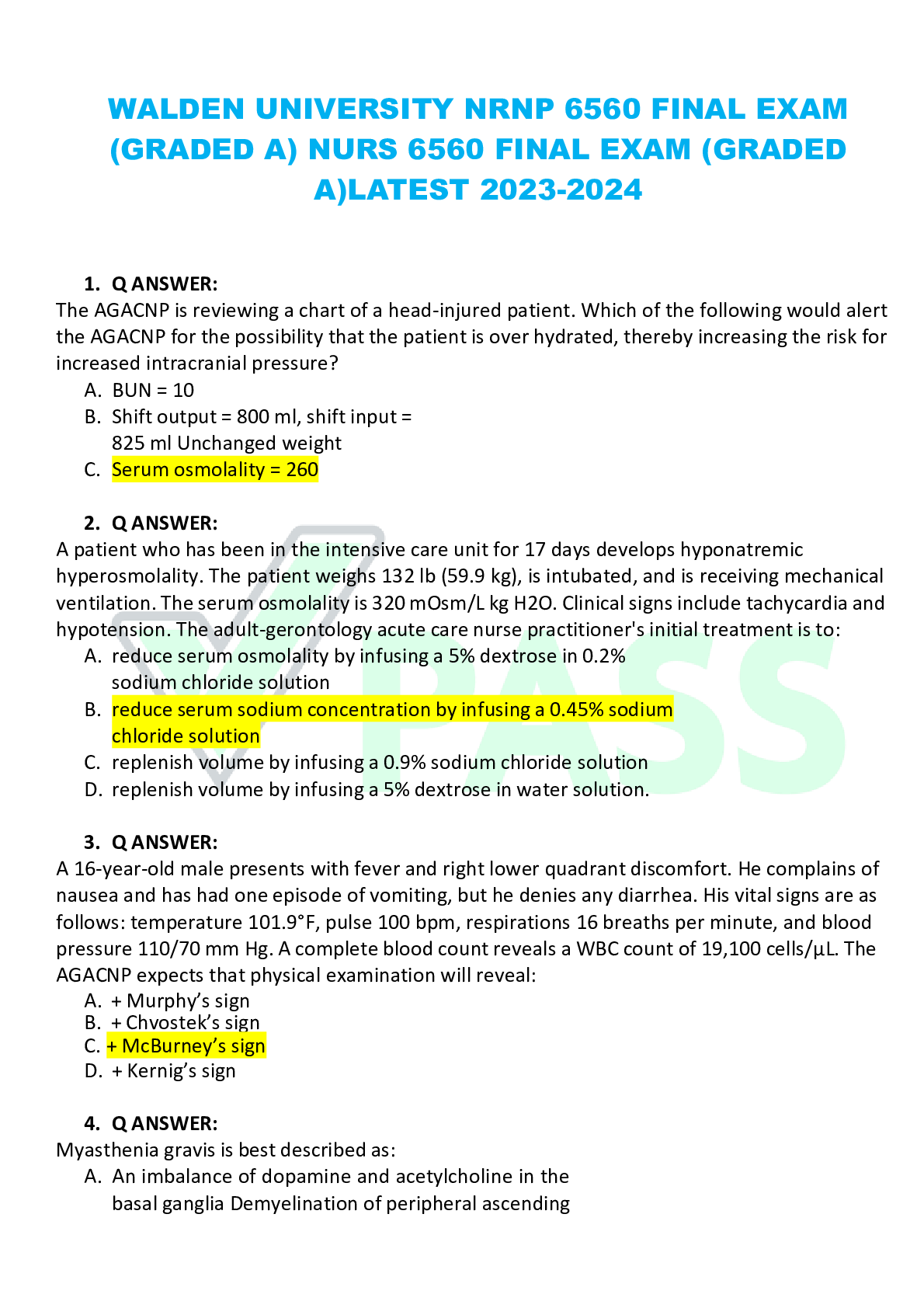
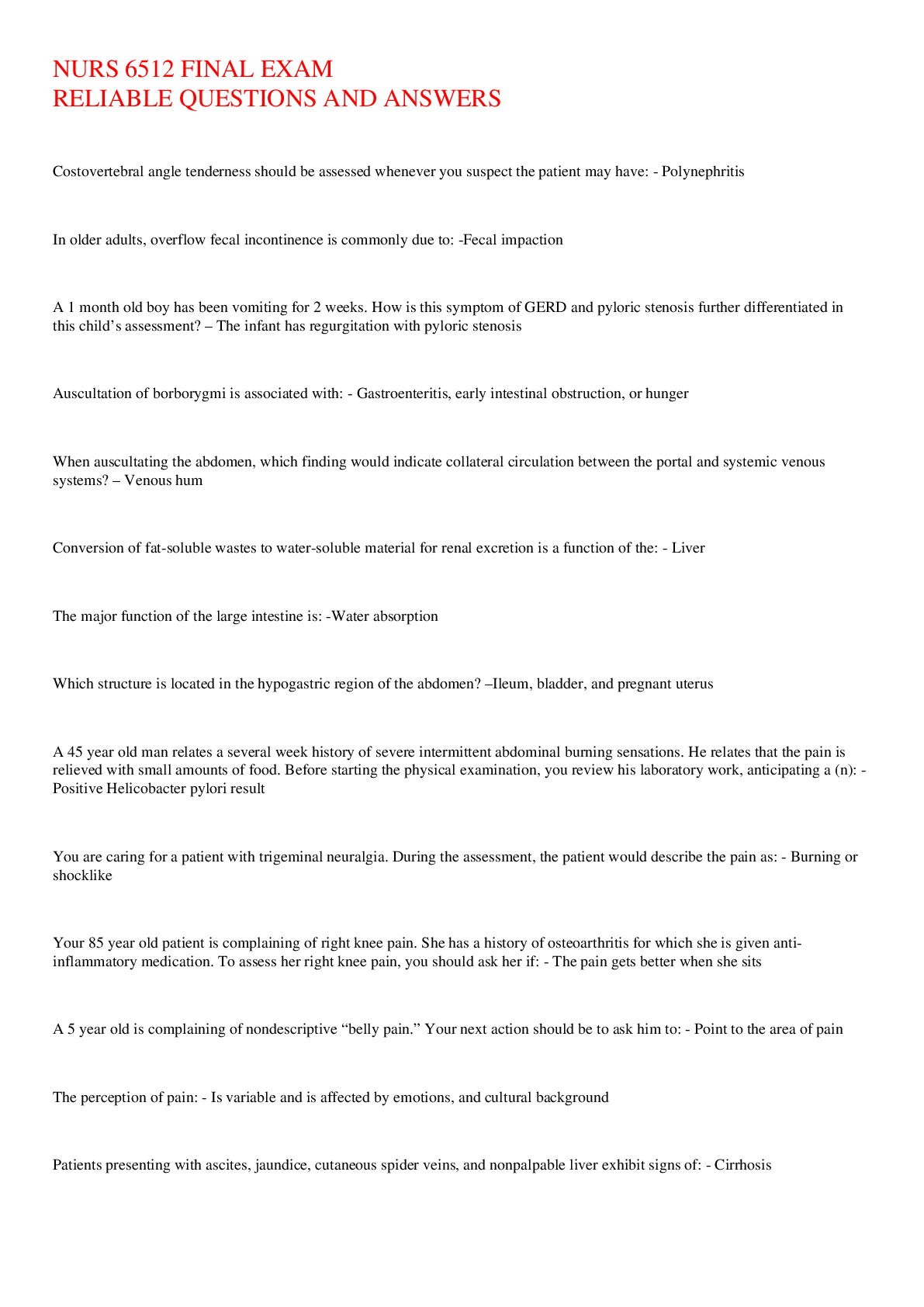
.png)

